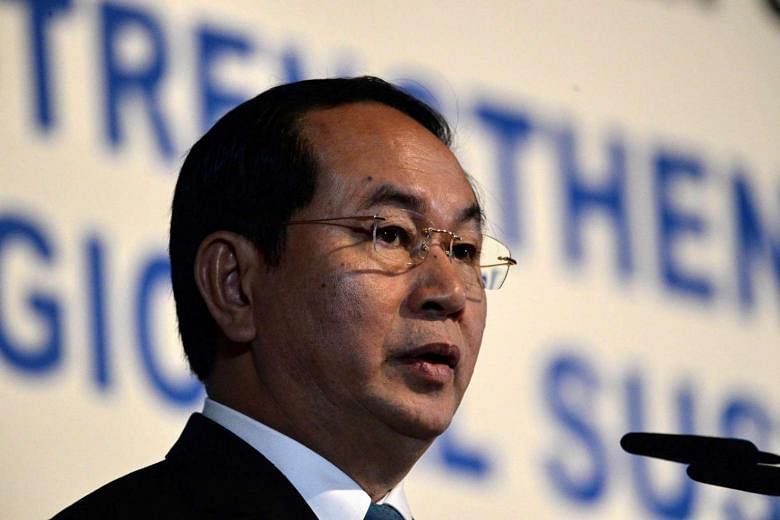SINGAPORE - It is in the interest of the entire region for all Asean member states to work towards a strong and coherent Asean, said Vietnamese President Tran Dai Quang.
This means standing united and acting together to promote cooperation on the basis of international law, equality and mutual interest, he said on Tuesday (Aug 30) while delivering the 38th Singapore Lecture.
The broad theme in Mr Quang's 20-minute speech in Vietnamese at the Ritz Carlton Millenia was of the need for greater cooperation between countries in the face of the grave challenges facing the world today, such as the South China Sea dispute.
Disputes, such as those over resources and territorial and maritime ones, are made worst by countries with a "might makes right" mindset, he added.
"The seriousness of these challenges is extremely worrying as long as the 'might makes right' mindset and the resort to the use of force still exists," he said.
Zooming in on the South China Sea dispute, Mr Quang said that recent clashes there are worrying, especially given its importance as a vital route for maritime and air transport.
China has been increasingly assertive in its claim to almost all of the sea through its reclamation projects and military build-up in the disputed areas.
It has also stepped up military drills in the sea, and warned the United States that its freedom of navigation patrols there could backfire and end in "disaster".
"The recent worrying developments in the region and the South China Sea have had negative impacts on the security environment of the region, especially maritime security and safety, freedom of navigation and overflight, threatening to erode trust and affecting the cooperation process of the region," he said.
"Should we allow instability to take place, especially in the case of armed conflicts, there will be neither winner nor loser, but rather all will lose."
Mr Quang said that a comprehensive regional architecture with Asean playing a central role "can satisfy the interests of all parties".
Alluding to recent disagreements that had threatened to derail Asean's unity, he reminded its member states that they have a shared destiny and to fortify the grouping in the face of challenges.
"Solidarity and consensus are distinct values that member states should respect and preserve," he said, calling them part of the "core principles of Asean".
The July meeting of Asean Foreign Ministers in Laos had ended without any agreement on how they were going to mention the South China Sea dispute in their communique.
Cambodia, a close China ally, had reportedly tried to block the mention of the maritime dispute in the joint communique, threatening to create a repeat of the debacle in Phnom Penh in 2012 when disagreement over the issue scuttled the statement altogether.
China, Taiwan and the four Asean nations of the Philippines, Vietnam, Malaysia and Brunei have overlapping claims to the strategic waterway.
Asked how Vietnam can contribute to a stronger Asean when recent developments had undermined the concept of Asean centrality, Mr Quang said that the principle of consensus within the grouping remains core to a strong Asean.
But this can be "supplemented" by other principles, he said, without elaborating.
"In order to ensure flexibility and effectiveness of handling of issues within the Asean community, we believe that it is possible for countries of Asean to consider a number of other principles as a supplementary to the principle of consensus in Asean," he said.
Mr Quang said Vietnam's position on the South China Sea issue remains consistent: that it continues to seek to settle disputes by peaceful means and on the basis of international law, including the 1982 United Nations Convention on the Law of the Sea (Unclos).
He added that Singapore, as a founding member of Unclos, "would understand the value of joining hands and joining minds".
"On regional and international issues, Vietnam and Singapore share fundamental interests in the building of a strong Asean and a reliable partnership system, as well as in the maintenance of a peaceful and stable international order that respects and adheres to international law," he said.


